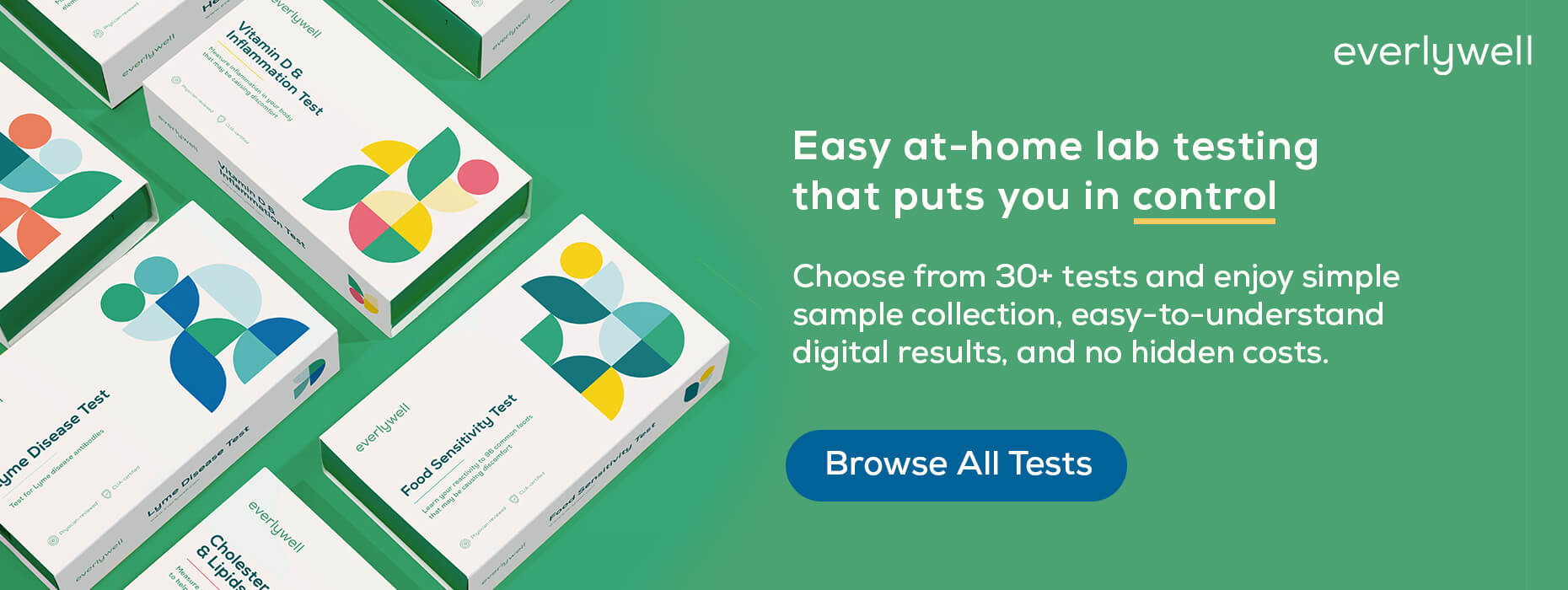
What happens during menopause?
Medically reviewed by Neka Miller, PhD on December 14, 2020. To give you technically accurate, evidence-based information, content published on the Everlywell blog is reviewed by credentialed professionals with expertise in medical and bioscience fields.
The gradual transition into menopause is something a menstruating woman will experience during her lifetime. Though menopause has some common signs and symptoms, it doesn't affect every woman in the same way: there are differences in the age of onset and the severity and duration of symptoms.
But what causes the changes in your body that occur during menopause? To understand what happens during menopause, let’s first discuss the changes your body experiences before, during, and after menopause—so read on to learn more.
Check hormone levels related to menopause from the convenience and privacy of home with the Everlywell at-home Perimenopause Test or Postmenopause Test.
What happens in the body during menopause?
The menstrual cycle and the process of menopause both involve a series of hormonal changes that regulate how your cycle works. The estrogen and progesterone in your body that regulate your monthly period are produced by the ovaries. Levels of these reproductive hormones fluctuate as you approach menopause (the transition to menopause is called perimenopause).
The definition of menopause is not having a period for 12 consecutive months, marking the permanent cessation of menstrual cycles. Menopause that happens naturally, and not as a result of some form of medical intervention such as cancer treatment, is called natural menopause.
Typically, the transition period to natural menopause occurs gradually, and the process occurs in three main stages.
Perimenopause
This is the menopause transition period when estrogen levels start to fluctuate. Perimenopause leading to menopause is associated with hormone level fluctuations, which can result in severe symptoms. The perimenopausal transition phase can begin eight to ten years before you get your last period, but perimenopause has an average length of about four years.
Check 3 key hormones that can help indicate if you are transitioning towards menopause with the Everlywell at-home Perimenopause Test.
Menopause
The second stage is actual menopause, the point in time when a woman has not had a menstrual cycle for 12 consecutive months. When the ovaries can no longer release an egg into the fallopian tubes to be fertilized in the uterus due to a drop in estrogen levels, monthly periods will cease. If you haven’t gotten a period in one whole year, there is a good chance that you have already reached menopause.
Related content: How long does menopause last?
Postmenopause
This is the time occurring after menopause that lasts for the rest of your life. Vasomotor and other symptoms can persist into postmenopause, and the low levels of estrogen can put postmenopausal women at significant risk of osteoporosis (resulting in weak and brittle bones). It’s estimated that, beginning with menopause, 1.5% of a woman’s total bone mass is lost annually, on average. Fortunately, regular exercise (particularly weight-bearing exercises) and supplementation with vitamin D and calcium can help ward off bone loss.
Check 2 key hormones that can indicate how well-balanced your hormones are after menopause with the Everlywell at-home Postmenopause Test.
Conditions that can lead to early menopause
Some medical conditions can lead to menopause earlier than normal. Menopause that occurs earlier than the age of 45 is called early menopause, and menopause that occurs earlier than the age of 40 is called premature menopause.
There are a few reasons why premature menopause can occur:
- Surgical menopause happens after the ovaries are removed by surgery. Removal of the uterus (a hysterectomy) does not cause menopause, but you will not get periods anymore. If the ovaries are removed along with a hysterectomy, then menopause typically results.
- If there is no obvious surgical or underlying medical reason for premature menopause, the condition is called premature ovarian failure, or primary ovarian insufficiency.
In all cases, early menopause and premature menopause cause fertility to be lost, and women cannot get pregnant anymore.
What are menopause symptoms?
The transition into menopause can be difficult for women who experience severe menopause symptoms. For these women, irregular periods and heavy bleeding can continue for years before they stop completely.
In addition, you may experience any of the following during perimenopause and sometimes continuing on to postmenopause:
- Irregular periods
- Hot flashes
- Night sweats
- Urinary tract infections
- Vaginal dryness
- Heavier or lighter vaginal bleeding during menstruation
- Weight gain
- Hair loss
What hormone changes happen during menopause?
By the time you are in your 40s, it is likely that you will start to transition into menopause. The series of hormonal changes that occur during the phase leading up to menopause involves hormones like estrogen and follicle-stimulating hormone (FSH).
Estrogen is necessary for vaginal lubrication, vaginal blood flow, thickening of the uterine lining during the menstrual cycle, and bone function. During perimenopause, estrogen levels start to fluctuate and eventually levels drop with the onset of menopause. Progesterone, which prepares the uterus for pregnancy, also sees a drop in levels after menopause when ovulation ceases to take place.
Conversely, the level of FSH is higher in menopausal and postmenopausal women. FSH plays a crucial role during ovulation, and when ovaries are no longer able to release an egg for fertilization the body responds by producing more FSH. (You can check in on your FSH levels with an at-home hormonal imbalance test.)
What happens after menopause?
Because of the lower levels of estrogen in the body, postmenopausal women have an increased risk for a number of conditions. Some of the major health concerns after menopause are the higher risk of heart disease and osteoporosis due to a loss of bone density. Menopause can also cause a decrease in sexual libido, or cause painful sex due to increased vaginal dryness.
How to check if you may be approaching menopause
Check whether hormone levels in your body may indicate a transition towards menopause with the Everlywell at-home Perimenopause Test. The test lets you easily collect your blood sample at home (with just a simple finger prick) and you receive quick, secure, and easy to understand digital results.
References
1. Menopause, Perimenopause and Postmenopause. Cleveland Clinic. URL. Accessed December 14, 2020.
2. The Postmenopausal Women. Endotext. URL. Accessed December 14, 2020.
3. Premature and Early Menopause. Cleveland Clinic. URL. Accessed December 14, 2020.
4. Secoșan C, Balint O, Pirtea L, Grigoraș D, Bălulescu L, Ilina R. Surgically Induced Menopause-A Practical Review of Literature. Medicina (Kaunas). 2019;55(8):482. Published 2019 Aug 14. doi:10.3390/medicina55080482
5. Primary ovarian insufficiency. Mayo Clinic. URL. Accessed December 14, 2020.
6. Reed BG, Carr BR. The Normal Menstrual Cycle and the Control of Ovulation. [Updated 2018 Aug 5]. In: Feingold KR, Anawalt B, Boyce A, et al., editors. Endotext [Internet]. South Dartmouth (MA): MDText.com, Inc.; 2000-. Available from: URL
